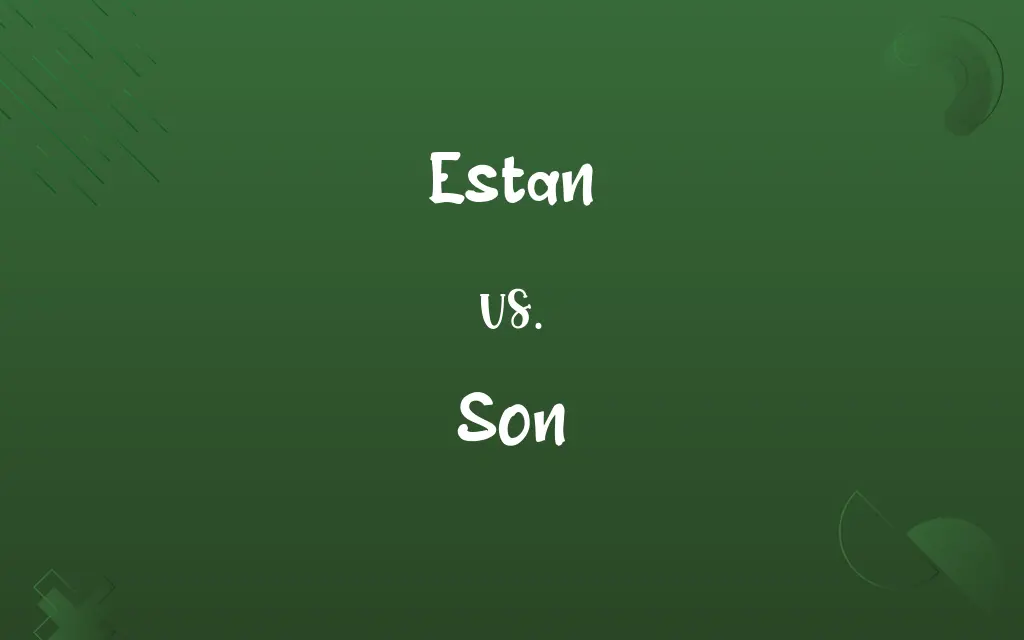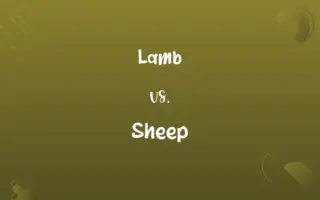Estan vs. Son: Know the Difference

By Shumaila Saeed || Published on February 28, 2024
"Están" and "Son" are both Spanish verbs; "Están" is the plural form of "estar," indicating location or temporary state, while "Son" is the plural form of "ser," used for permanent characteristics, origin, or time.

Key Differences
"Están" is used in the context of temporary states, conditions, or locations. For example, "Los libros están en la mesa" (The books are on the table). In contrast, "Son" is used for permanent traits, identity, or time. For instance, "Ellos son médicos" (They are doctors).
Shumaila Saeed
Feb 28, 2024
"Están" is a conjugation of "estar," which changes with the state or location. "Son" is a conjugation of "ser," used for inherent qualities or professions. This distinction is crucial in Spanish grammar.
Shumaila Saeed
Feb 28, 2024
"Están" often implies a condition that can change over time. E.g., "Están cansados" (They are tired). Conversely, "Son" suggests a more permanent or long-term condition, as in "Son felices" (They are happy).
Shumaila Saeed
Feb 28, 2024
"Están" doesn't imply origin or relationships. "Son," however, is used to express relationships or origins, like "Son de México" (They are from Mexico).
Shumaila Saeed
Feb 28, 2024
"Están" is not used to tell time, while "Son" is commonly used for this purpose. E.g., "Son las tres de la tarde" (It is three in the afternoon).
Shumaila Saeed
Feb 28, 2024
ADVERTISEMENT
Comparison Chart
Time Sensitivity
Implies changeable conditions
Indicates permanence or long-term
Shumaila Saeed
Feb 28, 2024
ADVERTISEMENT
Estan and Son Definitions
Estan
Used for physical or emotional states.
Están muy emocionados por el viaje. (They are very excited about the trip.)
Shumaila Saeed
Jan 11, 2024
Son
Used for professions or occupations.
Ellos son profesores. (They are teachers.)
Shumaila Saeed
Jan 11, 2024
Estan
Used for temporary states or conditions.
Las flores están marchitas. (The flowers are wilted.)
Shumaila Saeed
Jan 11, 2024
Son
Indicates nationality or origin.
Son de Argentina. (They are from Argentina.)
Shumaila Saeed
Jan 11, 2024
Estan
Implies a changeable situation or condition.
Las puertas están abiertas. (The doors are open.)
Shumaila Saeed
Jan 11, 2024
ADVERTISEMENT
Estan
Plural form of "estar" indicating location.
Los estudiantes están en la biblioteca. (The students are in the library.)
Shumaila Saeed
Jan 11, 2024
Son
Plural form of "ser" for permanent characteristics.
Son inteligentes y trabajadores. (They are intelligent and hardworking.)
Shumaila Saeed
Jan 11, 2024
Estan
Indicates a temporary action in progress.
Están estudiando para el examen. (They are studying for the exam.)
Shumaila Saeed
Jan 11, 2024
Son
For telling time or dates.
Son las diez de la mañana. (It is ten in the morning.)
Shumaila Saeed
Jan 11, 2024
Repeatedly Asked Queries
Can "Están" and "Son" be used interchangeably?
No, their usage depends on the context of permanence or temporariness.
Shumaila Saeed
Feb 28, 2024
Is "Son" appropriate for describing emotions?
Only if the emotion is considered a permanent trait.
Shumaila Saeed
Feb 28, 2024
Can "Están" express long-term states?
No, it's used for temporary or changeable conditions.
Shumaila Saeed
Feb 28, 2024
How is "Son" used differently than "Están"?
"Son" is used for permanent characteristics, professions, or origins.
Shumaila Saeed
Feb 28, 2024
How does "Están" work in indicating location?
It specifies the current, potentially changeable, location of things or people.
Shumaila Saeed
Feb 28, 2024
What does "Están" signify in Spanish?
"Están" indicates a temporary state, condition, or location.
Shumaila Saeed
Feb 28, 2024
Are "Están" and "Son" both plural forms?
Yes, they are plural forms of "estar" and "ser" respectively.
Shumaila Saeed
Feb 28, 2024
In what context would "Están" not be suitable?
For describing permanent qualities or inherent characteristics.
Shumaila Saeed
Feb 28, 2024
How is "Son" used in familial relationships?
To describe relationships, like "Son mis padres" (They are my parents).
Shumaila Saeed
Feb 28, 2024
Does "Son" ever indicate location?
No, "Son" does not indicate physical location.
Shumaila Saeed
Feb 28, 2024
Is "Son" used for temporary conditions?
No, it's reserved for more permanent states.
Shumaila Saeed
Feb 28, 2024
Is "Están" used for physical descriptions?
Only for temporary conditions, not permanent physical traits.
Shumaila Saeed
Feb 28, 2024
Can "Están" be used for weather expressions?
Yes, for temporary weather conditions.
Shumaila Saeed
Feb 28, 2024
In what situations is "Están" most commonly used?
For temporary locations, states, and ongoing actions.
Shumaila Saeed
Feb 28, 2024
Can "Están" imply a future state?
Generally, it refers to the current state, not future.
Shumaila Saeed
Feb 28, 2024
How does "Son" convey identity?
It expresses aspects like nationality, profession, or relationships.
Shumaila Saeed
Feb 28, 2024
Is "Son" appropriate for expressing feelings?
Only for feelings considered characteristic of a person.
Shumaila Saeed
Feb 28, 2024
Share this page
Link for your blog / website
HTML
Link to share via messenger
About Author
Written by
Shumaila SaeedShumaila Saeed, an expert content creator with 6 years of experience, specializes in distilling complex topics into easily digestible comparisons, shining a light on the nuances that both inform and educate readers with clarity and accuracy.








































































